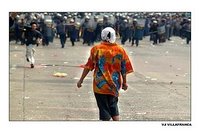
PERPETUITY AND IMPERMANENCE: TO ARLIE NAVA, IN MEMORIAM
RENATO REDENTOR CONSTANTINO
ParasIndonesia.com
April 19, 2006
Business Mirror
April 20, 2006
Death is something we do not have to fear, wrote the Spanish poet Antonio Machado. "As long as we exist death doesn't, and when it does, we don't."
Of course, death is easier said than done.
Some live each day as if it were their last. Some hope and without fanfare work for the day when even the maledictions of our time will shed the malice of its makers. Some live as if they would live forever even though perpetuity never lasts.
The Roman Empire believed it was eternal. The Ottomans thought its seed would never wither. The British held that its interminable global reign was timeless.
Sure, said Gualterio Malatesta, the sinister swordsman in Arturo Perez-Reverte's novel Captain Alatriste. "Life is long -- until it ends."
 What is eternity? To the lover who has just met the woman or man of his life, forever is a moment and always too short. An ant's afternoon, according to the novelist Barbara Kingsolver. It is a snapshot, or snapshots, such as the photos that line the walls of a small proud pub in Manila called The Oarhouse. The photos -- each one tremendously moving -- were shot by different Filipino photographers on the day the Arroyo administration outlawed People Power -- on February 24, 2006, also known as People Power day. The pictures tell the story of people on the streets, of power and eternal truths -- the celebration of remembrance, threats of violence; defiance; violence and blood and even more defiance. Save for a few, however, most of the pictures were not published by leading national dailies.
What is eternity? To the lover who has just met the woman or man of his life, forever is a moment and always too short. An ant's afternoon, according to the novelist Barbara Kingsolver. It is a snapshot, or snapshots, such as the photos that line the walls of a small proud pub in Manila called The Oarhouse. The photos -- each one tremendously moving -- were shot by different Filipino photographers on the day the Arroyo administration outlawed People Power -- on February 24, 2006, also known as People Power day. The pictures tell the story of people on the streets, of power and eternal truths -- the celebration of remembrance, threats of violence; defiance; violence and blood and even more defiance. Save for a few, however, most of the pictures were not published by leading national dailies."Why does the fulfillment of our promise as a people always seem to be just within grasp yet forever out of reach?" Bruce Springsteen once asked. Perhaps he was speaking to Filipinos?
Springsteen would certainly be most welcome at the Oarhouse, which continues to attract its fair share of celebrities from the showbiz, political and music world. Pepe Smith nurses his beer there from time to time. So does Heber Bartolome and Elvis, who, in his most recent incarnation as a long-salt-and-pepper-haired photographer-opossum, sits nightly on the bar stools and couches to suckle on his lager. Others disagree, however, and insist that Elvis was not the being that the nocturnal creature had previously assumed but George Brown, the foreign secretary of the UK in the 1960s who is once said to have invited a guest in flowing purple robes at a reception in Peru to dance, a bop which did not materialize: "First, you are drunk," the guest is said to have replied. "Second, this is not a waltz; it is the Peruvian national anthem. And third, I am not a woman; I am the Cardinal Archbishop of Lima."
Laughter is scripture and drink holy fare at the Oar, a house of heretics frequented by a tightly knit, hardy gang of photojournalists, correspondents and quotidian denizens.
It was at the Oar that I last saw Arlie Gideon Nava, poet, storyteller, filmmaker and friend. Arlie walked past the veil of our world on April 4, 2006. He was 35.
Arlie was a quiet man with a healthy sense of humor; silence was his sonic wash. When he giggled he would share his mirth with friends. But he would keep his worries often to himself, or talk it over quietly with friends or quietly make fun of it. All the friends and members of his family I had conferred with said he was a sensitive man and that he felt acts of injustice deeply, as if these were stabs at his own heart.
"We outlast the night while we winnow alms from our amassed experience," one of Arlie's poems reminds us. "We keep watch over whatever it is we have buried in our senses / for the poetry that we craft is the engraving on the headstone / with which we will seal the grave of our foes."
Arlie is gone. He is sorely, deeply missed at the Oar. But each night that a drink is lifted in his honor -- which is virtually every night -- he is there and chuckles with the rest of us. He has merely moved on.
"I can remember how when I was young I believed death to be a phenomenon of the body," wrote William Faulkner. "Now I know it to be merely a function of the mind -- and that of the minds who suffer the bereavement. The nihilists say it is the end; the fundamentalists, the beginning; when in reality it is no more than a single tenant or family moving out of a tenement or a town."
"Do we stop the clock when death surprises us?" asked the war correspondent Robert Fisk, in his magisterial memoir, The Great War for Civilisation.
If we could I think we would.
Photo by VJ Villafranca, courtesy of www.Oarhouse.blogspot.com
NOTES:
1. Arturo Perez-Reverte, Captain Alatriste, (Plume, 2006).
2. Check out the Oarsite and more info regarding the great exhibit.
3. Bruce Springsteen, "Chords for Change," New York Times, 5 August 2004.
4. Sara Lyall "...as a rat," Bangkok Post, 14 January 2006.
5. This is an English version of Arlie's poem, my loose translation, if you will. The "you" in the original of the poem I wrote as "we" in the article so that Arlie's poem may speak, too -- or mainly -- to the reader in a way that includes the reader. Here is the original of Arlie's poem, which was displayed at his wake with his photograph: "Nadadaig mong magpuyat ang magdamag / Sinisinop ang abuloy ng naipong karanasan / Naglalamay sa anumang nakaburol na pandama / Ang paglikha mo ng tula'y pag-ukit din ng lapida / At sa puntod ng kaaway pangarap mong ipangsara."
6. William Faulkner, As I Lay Dying (1930). See William Faulkner on the Web.
7. Robert Fisk, The Great War for Civilisation: The Conquest of the Middle East, p. 238 (NY: Alfred E. Knopf, 2005)
BACK TO RED's MAIN PAGE
No comments:
Post a Comment